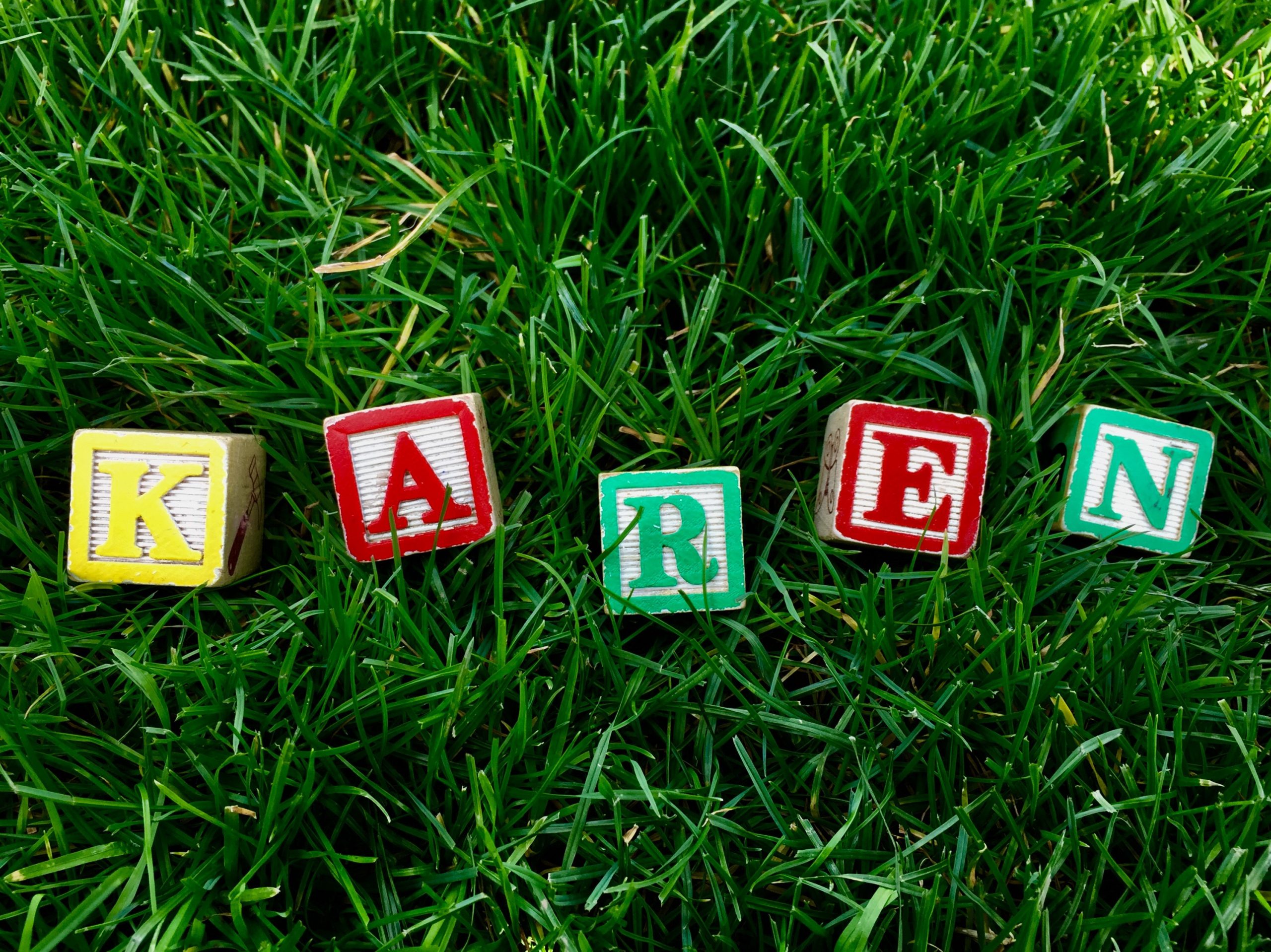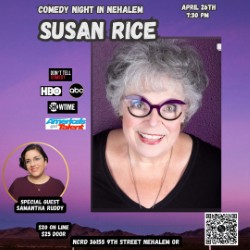By Karen Olson
Hello … I’m a Karen.
All my babysitters, it used to seem, were named Karen. Even as a kid, I recognized that I was about half a generation too late to be part of the “Karen” boom. Karens lived in subdivisions and wore “mom jeans” and were born between 1950 and 1975. There were no cute nicknames for Karen, no famous role models or celebrity Karens except my beloved Karen Carpenter, and later the figure skater Karen Kwan. Before the memes, there was nothing particularly exciting or interesting about being a Karen.
What exactly happened to turn all of us plain old Karens into a cultural moment? How did everyone from problematic cop-callers (“Central Park Karen”) to anti-mask ranters in Starbucks and Target (“Walmart Karen”) to the president of the United States (“The Karen in Chief”) become “Karens,” no matter that their actual names were Jennifer or Amy or Donald? Why does it seem that every major news outlet and website, from The New York Times to Buzzfeed, is producing pieces about what it means to be a Karen?
You can, as I have, take a deep dive into the evolution of Karen, which incorporates everything from whiny Reddit threads, to a snarky Nintendo commercial, to reality TV star Kate Gosselin, to Sir Mix-a-Lot’s “Baby Got Back,” to a Dane Cook comedy routine, to the coronavirus pandemic (I’ve included a Karen reference list at the end of this piece for those so inclined.) It’s fascinating to see our language evolve in real time, especially in the Internet era, when viral cell phone videos and memes accelerate and influence the words we use and what we mean by them.
I’ll be honest, I wish the world had picked a different name to pick on. I don’t love that my name, the one word that identifies my personhood to the rest of the world around me, has this new and unattractive connotation. The baby name books say that Karen means “pure,” but Urban Dictionary goes with “rude, obnoxious, and insufferable.” And it hints at our collective misogyny that even badly-behaving men are called Karens, not some male name equivalent.
But it’s essential that we understand the difference between a person in power name-calling to diminish and demean — that’s bullying — and those who have been oppressed or are in danger using coded language to describe their reality without exposing themselves to further harm. This is a place for us to think critically, allow for nuance, and employ empathy.
The Black community has historically had to use code names to talk about the deceptive and dangerous behavior of white people. The resources I’ll share below explain that, from the days of chattel slavery through the Jim Crow era and into the present, white women have a sordid history of weaponizing their relative privilege to harm and punish Black people. Karen, like her forebears, uses her position and power to malign, to falsely accuse Black people, putting them in real danger of retaliation and violence and death.
I hate that my name has become shorthand for “entitled, racist, ignorant white woman,” signifying at best self-centered cluelessness and at worst dangerous and insidious racism weaponized against people of color. But I have to acknowledge that yes, Karens are real, and yes, Karens pose a real threat to their neighbors. I definitely don’t want to be a Karen.
I feel a little better when someone (always a white female friend) tells me, “oh, you’re not that kind of Karen” or “oh, I never even thought of you when I saw the memes; you’re different than that.” I want to be different. But I think I–and those who, like me, share in white privilege–need to be careful when our instinct is to say “not me,” to self-identify as good or safe or not-racist. “I’m not that kind of Karen” is an unhelpful posture for self-reflection.
Sadly, it doesn’t take much imagination to see myself in the memes, hear my own voice plaintively begging for the world to treat me the way I think I deserve. Perhaps I don’t want to face my own tendency to see my way as the only way, the right way, and impose that vision on everyone else around me. I don’t want to admit to my own racial bias, my own sense of entitlement, my own potential to blame and threaten others. It’s not an attractive look for a Karen.
I do know this, I cringe when I identify myself as “Karen” to customer service on the phone, and I’m reminded to be respectful and kind. Because I know that I hold, as one writer put it, “peak Karen power,” I need to empower and lift others up, rather than grasping for more and more privilege for myself. I have to become more conscious of the ways that my choices affect my most vulnerable neighbors. And I’m trying to stay open to criticism and correction when I do behave badly. I want to learn; I want to do better.
Yes, I’m a Karen. And I don’t need to change my name, but I hope that I can be willing to change my heart.
SOURCES:
The Evolution of “Karen”
Sarah Miller, “My So-Karen Life,” https://www.nytimes.com/2019/12/07/style/its-karentown.html (The New York Times, December 7, 2019)
Aja Romano, “Karen: The anti-vaxxer soccer mom with speak-to-the-manager hair, explained,” https://www.vox.com/2020/2/5/21079162/karen-name-insult-meme-manager (Vox, February 5, 2020)
Karen Attiah, “The ‘Karen’ memes and jokes aren’t sexist or racist. Let a Karen explain,” https://www.washingtonpost.com/opinions/2020/04/28/karen-memes-jokes-arent-sexist-or-racist-let-karen-explain/?arc404=true (The Washington Post, April 28, 2020)
Kaitlyn Tiffany, “How ‘Karen’ Became a Coronavirus Villain,” https://www.theatlantic.com/technology/archive/2020/05/coronavirus-karen-memes-reddit-twitter-carolyn-goodman/611104/ (The Atlantic, May 6, 2020)
David A. Graham, “The Karen in Chief,” https://www.theatlantic.com/ideas/archive/2020/05/trump-social-media-scarborough/612193/ (The Atlantic, May 28, 2020)
Leah Asmelash, “How Karen became a meme, and what real-life Karens think about it,” https://www.cnn.com/2020/05/30/us/karen-meme-trnd/index.html (CNN, May 30, 2020)
Robin Queen, “How ‘Karen’ went from a popular baby name to a stand-in for white entitlement,” https://theconversation.com/how-karen-went-from-a-popular-baby-name-to-a-stand-in-for-white-entitlement-139644 (The Conversation, June 12, 2020)
Rachel E. Greenspan, “How the name ‘Karen’ became a stand-in for problematic white women and a hugely popular meme,” https://www.insider.com/karen-meme-origin-the-history-of-calling-women-karen-white-2020-5 (Insider, June 26, 2020)
Margot Harris and Palmer Haasch, “Videos of people labeled ‘Karens’ have flooded the internet, drawing curiosity, condemnation, and criticism. Here’s how they took over our feeds during quarantine,” https://www.insider.com/karen-compilation-timeline-white-women-racism-2020-6 (Insider, July 2, 2020)
Cady Lang, “How the ‘Karen Meme’ Confronts the Violent History of White Womanhood,”
https://time.com/5857023/karen-meme-history-meaning/ (Time, July 6, 2020)
Brooklyn White, “Op-Ed: It’s Time To Call ‘Karens’ What They Are—White Supremacists,”
https://girlsunited.essence.com/article/feature-op-ed-karen-white-supremacy/ (Girls United, July 6, 2020)
“The Karen,” https://slate.com/podcasts/decoder-ring/2020/07/decoder-ring-the-karen (Decoder Ring, July 13, 2020)
“What’s In A ‘Karen’?,” https://www.npr.org/2020/07/14/891177904/whats-in-a-karen (Code Switch, July 15, 2020)
Aja Romano, “How ‘Karen’ Became a Symbol of Racism,” https://www.vox.com/21317728/karen-meaning-meme-racist-coronavirus (Vox, July 21, 2020)
Henry Goldblatt, “A Brief History of ‘Karen’,” https://www.nytimes.com/2020/07/31/style/karen-name-meme-history.html (The New York Times, July 31, 2020)
Know Your Meme, “Karen” https://knowyourmeme.com/memes/karen
Dictionary.com, “Karen” https://www.dictionary.com/e/slang/karen/


